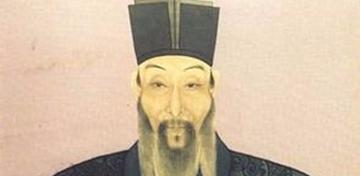
In the twenty-second year of the Qing Kangxi Dynasty (1683), Zheng Ketui, the king of Yanping in Taiwan, surrendered to the Qing Dynasty, and on August 13, Shi Lang entered Taiwan and was surrendered, and the Qing court recovered Taiwan. Subsequently, Zheng Ketuan's entire family and descendants of the Ming Dynasty were sent to Jingshi. But before that, there was a Ming Empress who was saying goodbye to his family, he did not want to be a foreign minister, and chose to end his life at this time to pursue his homeland, he was Zhu Shugui, the king of Ningjing.
Zhu Shugui (朱術桂), also spelled Tianqiu (天球), nicknamed Yiyuanzi (一元子), was born in the forty-fifth year of the Ming Dynasty (1617) of the Ming Dynasty,1617, and was first enfeoffed as a general of the Auxiliary State and was enfeoffed in Jingzhou. In the fifteenth year of Chongzhen (1642), Zhang Xianzhong attacked Jingzhou, and Zhu Shugui and King Hui, as well as the clan, took refuge in the lake. Two years later Chongzhen committed suicide, and King Fu proclaimed himself emperor in Nanjing, for the Southern Ming Hongguang Emperor, Zhu Shugui and his brother King Yang entered the dynasty and were made generals of Zhenguo. Emperor Longwu made him the Prince of Ningjing and went to Fang Guo'an to serve as an overseer. After the Qing army moved south, Zhu Shugui was welcomed by Zheng Cai to Xiamen. At this time, Emperor Longwu was dead, and Zhu Youluo, the King of Gui, was honored as the Yongli Emperor. Zhu Shugui went to the hajj, and the Yongli Emperor ordered his governor Zheng Chenggongshi, who treated him with royal courtesy and let him live in Kinmen and Xiamen. In the sixteenth year of the Yong calendar (1662), Zheng Chenggong died shortly after recovering Taiwan, and his son Zheng Jing succeeded him as King of Yanping. The following year, Zheng Jing welcomed King Ningjing to Taiwan and built the Ningjing Palace for him to live in Chengtianfu. He also offered Him to Zhu Shugui, but did not proclaim him emperor or overseer. Zhu Shugui saw that Taiwan had just begun to open up, and the soil was fertile, so he reclaimed the countryside in the area of Zhuhuzhuang in Wannian Prefecture and expanded the countryside for dozens of years.
In 1681, Zheng Jing died, and his son Zheng Ketuan, who was only 12 years old, was proclaimed the Prince of Yanping by Feng Xifan and Liu Guoxuan. However, after that, the Qing court began to send troops to attack Taiwan, and successively captured Kinmen, Xiamen and penghu islands, resulting in the opening of the gateway to Taiwan. In July 1683, Zheng Ketuan was asked to surrender. Zhu Shugui, who heard this letter, decided to martyr himself. On July 20, Zhu Shugui summoned his concubines and said: "Lonely and unethical, upside down overseas, I hope to protect the rest of the year to see the first emperor and the first king underground, now the big thing has gone, there is a day of lonely death, Ru generation young Ai, can calculate themselves." The five concubines who accompanied the attendants all wept to each other: "Since the king can be fully versed, the concubines will lose their bodies, the king will be born, and the king will die, please give the ruler first, and die with the king." Then he hanged himself in the middle hall. The next day, that is, he added wings to the good crown, wore the dragon robe around the four circles, tied the jade belt, and peiyin, and sent the Seal of the Ningjing King's Partridge Button to Zheng Ketui. Zheng Ketuan led Wen Wuzhi and sighed goodbye. The king bowed to the ancestors of heaven and earth. The two eunuchs were also killed at the age of sixty-six.
Tomb of King Ningjing
Before Zhu Shugui died, he wrote to Yu Biyi: "Since the noonday thief fell into Jingzhou, he went south with his family." Jia Shen avoided chaos in the Fujian Sea, always had a few hairs, a small body, and had been diving overseas for more than forty years, and now there are six of them in their sixties. In times of great trouble, he had to die with his hair crowned. Do not live up to the high emperor, do not live up to the parents, life is over, no shame. On August 13, Shi Lang led his army into Taiwan and was surrendered.